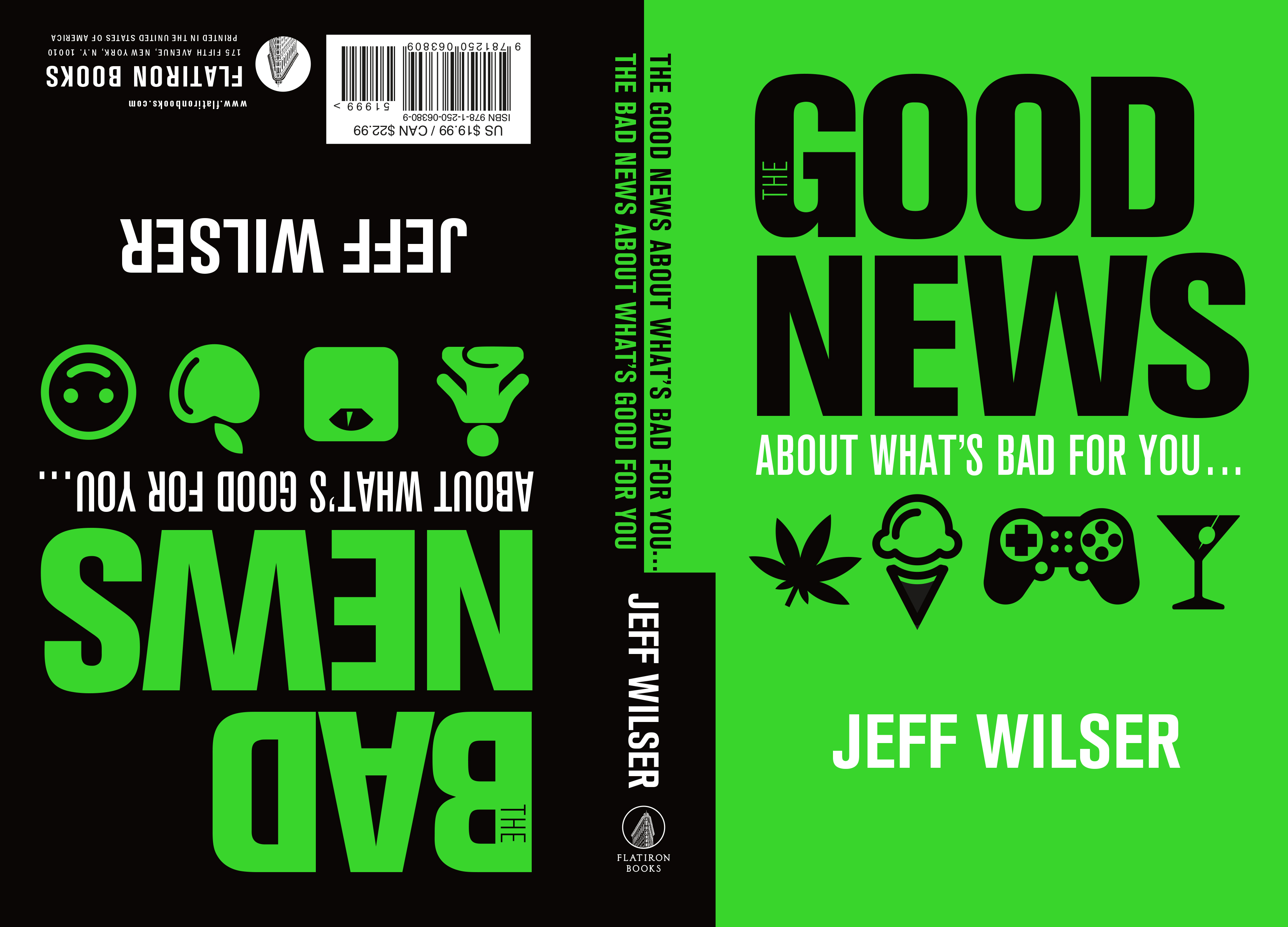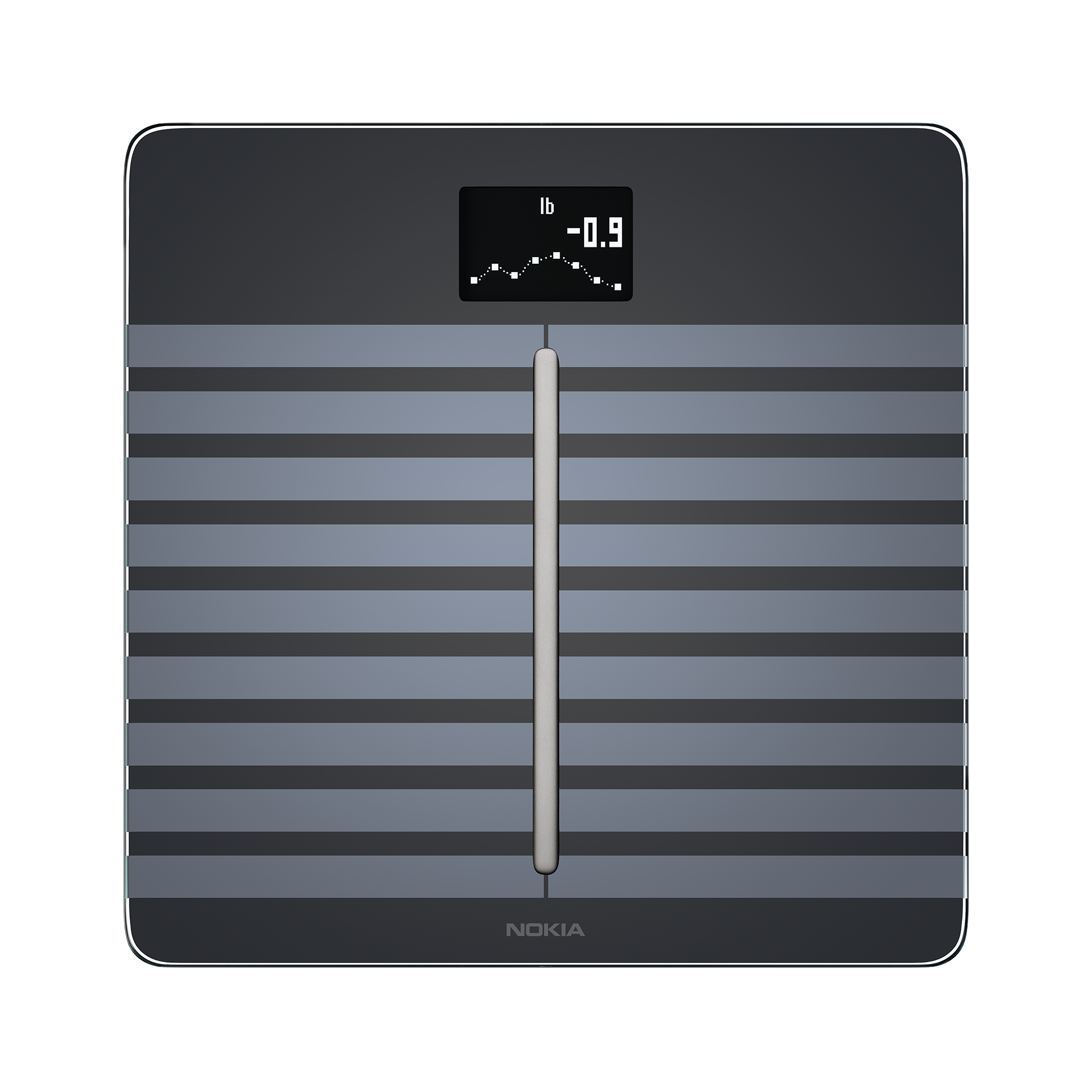
OK maybe bacon isn’t awesome, but we all hold some truths to be self-evident: stress is bad, pesticides are worse and a 30-day green tea, gluten-free, low-carb diet will reward us with glowing health, right? Not so fast. Read on for some surprising answers we got from an author who says he has the skinny on some big fat wellbeing myths.

When it comes to the risk of food poisoning and carb load, a salad and a smoothie can be way worse for you than a bucket of clams and an ice cream cone, as demonstrated by Jeff Wilser, pictured, in his new book The Good News About What’s Bad for You… and the Bad News About What’s Good for You. Wilser’s informative and entertaining book (that in print form can be literally flipped to read as two volumes) is filled with facts gleaned from experts and is dedicated “to everyone who has ever felt guilty about eating red meat, drinking bourbon, or not buying organic.” A veteran investigative writer with three other books to his credit, Wilser’s work has appeared in many major magazines and newspapers including GQ, Glamour, and the Chicago Tribune.
If you’re wondering what gives the 39-year-old, New York City-based writer and former Marine the authority to debunk our dearest beliefs and dole out seemingly shocking advice — like how worrying, gossip and failure can be rebranded as life enhancers — the answer is research. Bewildered and hungry for knowledge, he spoke to scores of experts so you wouldn’t have to. He even made himself a human guinea pig to get to the bottom of what does or doesn’t make us fit and what makes us sick.
Interview with Jeff Wilser
Withings: Thanks for talking with us, Jeff. The book’s great, and organized in such a smart way. First things first: What qualifies you to write about health? Why should we listen to you?
Jeff Wilser: I want to be forthright. I am not a health expert. Like your readers, I was confused and curious. I have been confused for years. Is it true that fat is bad? Or is it sometimes good? Why does it seem like things are good one week, and bad the next? You’re reading the papers and an article on page 14 says something is bad, and a recipe on page 37 says, hey, use this for a meal. So I’m not an expert. But I spoke to a small army of doctors, and psychologists, and fitness experts to make sense of it all.
How did you get into this line of work?
I was not a writer in high school or college. I wish I’d had that kind of clarity and foresight. I discovered writing at a later age. I came to it out of process of elimination. I looked at different career options, I had a spreadsheet. I had pro and con columns. Should I be a history professor? I didn’t want the pressure to publish, lobby for tenure. I mean, I like Greek history, but do I want to spend three years studying one piece of wood?
You say you ate nothing but junk food for a full month as research for this book, and lost 11 pounds. Beyond the concept of calories in/calories out, you said you didn’t feel bad?
It’s not accurate to say I never felt bad. I was surprised that I never felt that hungry. I was getting just enough caloric and nutritional intake to feel OK. But, for that to happen, I had to be meticulous about consuming this food on an exact schedule. The not-very-secret secret to this experiment was tracking calories. It’s doable, but a normal person [eating normal food] could have breakfast, lunch, and dinner, and be fine. I never felt that bad, but I never felt great. I felt just on the edge. I was also eating protein shakes so I didn’t waste away.
What led you to do this?
I was inspired by Dr. Mark Haub at Kansas State University. His results were more striking. He lost 27 pounds in two and half months eating Twinkies and other junk food. The science community is two for two. Just as Dr. Haub did, I went to a doctor before and after, and got a complete physical. I lost weight. My good cholesterol went up, and my bad went down.
Would you call yourself a debunker?
I have debunked in the past. But no. I think what I try to do is bring perspective. Debunking implies I have a massive authority. I have immense respect for so much of the health community. But it’s very easy to get lost in the back and forth of health news.
A lot of us feel guilty about what we eat, and feel afraid about our buying choices. We’re worried we’re doing it wrong. We feel there’s a big gap between what we should be doing and what we actually are doing. It’s not just food, it’s exercise and other things, too. Sometimes there is no gap… if you enjoy butter, instead of using margarine use butter. Studies show it’s not likely the case that imitation butter is better. Plenty of studies suggest that chemical alternatives to butter aren’t any better and may be worse. If you’re going to have butter, you might as well have butter. If you enjoy eating steak, studies show that you can eat some. It’s about the dosage. There’s a fear that red meat and fat make us far more likely to have heart attacks. There’s a wing of the health community that doesn’t believe that at all. There are contradictory studies out there.
Are there any hard-and-fast “shoulds?”
We often don’t think enough about the concept of dosage, or how much. We get so wrapped up in the quality of food and exercise. Gluten or not, paleo or non-paleo… we think about antioxidants, and if it’s organic or not organic. My kind of radical idea is that the quantity of food is as important or more important than quality. If you pour blueberries all over your massive bowl of cereal, the superfood doesn’t counter the possibly huge bowl of sugar and calories you’re taking in.
What advice would you give, based on your research?
People can relax about health. It’s a serious issue, and we can’t sit on our couches and do whatever we want. Sadly, I found no studies saying we’re better off if we sit on the couch. I looked long and hard. But the simple rules of health are: eat in moderation and exercise.
So, we should exercise?
Yes, but there are diminishing returns. Running a few times a week? Great. Science links that to better health. But marathon running, or running seven times a week? Some studies show that that could be linked to higher rates of heart attack. Again, it’s dosage and moderation. We might be training ourselves to be ultra marathon runners, but are we really healthier when we do?
What should we eat, then?
We tend to demonize foods, and we tend to lionize foods. We put certain foods on pedestals. Some of the demonized foods can be eaten if we don’t go crazy. But studies do not necessarily show that local organic kale is that much better than frozen spinach from the grocery store.
The book touches on the goods and bads of other areas of life, too. I liked what you wrote about profanity. Can you tell us more?
Some evidence says that there is an evolutionary advantage to using profanity. And I was f–ing delighted to hear it! Profanity is an emotional language that taps into a different part of our brain, and it could give our bodies the ability to react differently. Subjects whose hands were submerged in ice water tolerated pain better when they spewed profanity. I find that experiment both sadistic and hilarious.
What else?
To give you a grab-bag: There are mindsets that we feel guilty about, like, oh I shouldn’t do that or I’m a bad person. Complaining, for example, in the right way can be useful. Psychologists say bottling things up can bad for our health. Stress can be leveraged to make us less stressed. Research from Kelly McGonigal who wrote The Upside of Stress suggests that stress was built to help us. It’s what unleashes our adrenaline to help us run from bears. The problem is that when we are always stressed, it starts to break down. But, if we have a deadline at 8am, we can say, allright, I’m gonna use this stress to get this job done. And gossip has a dark side, but it also has a function in reinforcing social norms. Gossip in the workplace, for example, keeps people on the right road.
So, what would you like readers to know?
You can relax. Don’t lionize or demonize. Lots of things can be healthful up to the point of diminishing returns. Moderation is the key. And with food… The point is that moderation is such a powerful force that it works even when you’re eating crap. The crap isn’t the enemy. Excess is the enemy.
You can follow Jeff on Twitter @jeffwilser



